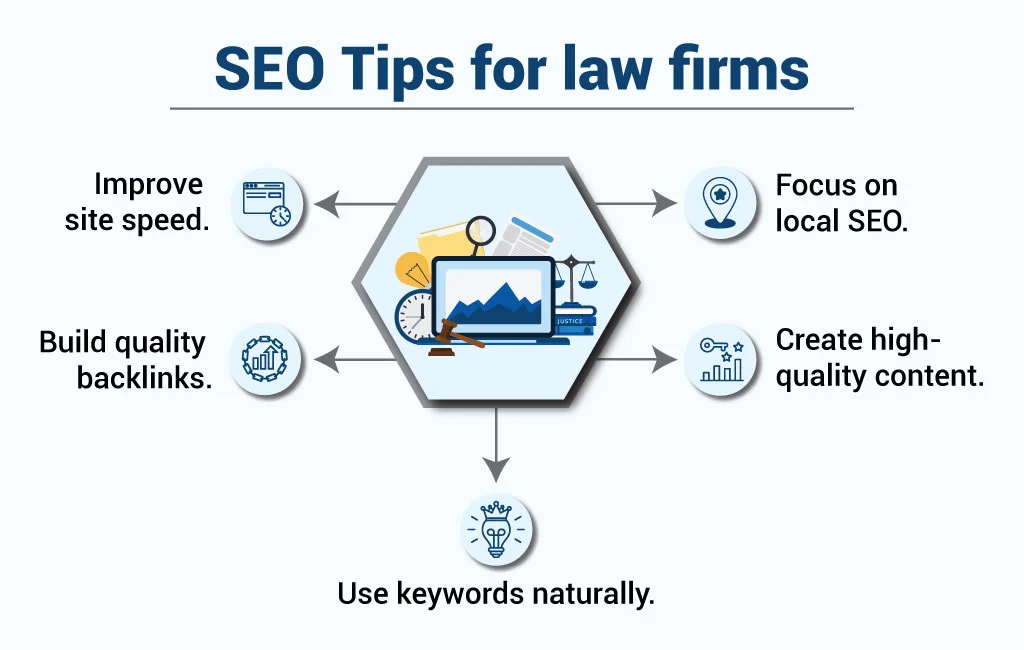Finding new clients as a lawyer can feel like an uphill battle, especially in today’s online-first world. But what if your ideal clients were already searching for your services—and you just needed to help them find you?
That’s where SEO for lawyers comes into play. Be it running a solo practice or part of a large firm, mastering lawyer SEO can be the game-changer that helps you rank higher on Google, connect with the right clients, and grow your business.
So, are you ready to make your law firm the go-to choice online? Let’s get started!
Understanding SEO for Lawyers
Law firm SEO refers to the process of improving your website’s visibility on search engines like Google to help potential clients find you more easily. In simpler terms, it’s about ensuring your law firm shows up when someone searches for legal services in your area.

For example, let’s say a person types “best criminal defense lawyer near me” into Google. If your website is optimized with the right keywords, a strong local SEO presence, and useful information, it can rank higher in the search results. This means that a person is more likely to click on your site, explore your services, and potentially become your client.
Hence, by investing in SEO for lawyers, you are not just driving traffic to your website—you are connecting with people actively looking for legal help. It’s a smart, long-term strategy to grow your client base and establish your law firm as a trusted leader in the field.
Creating a Digital Marketing Strategy for Lawyers
Every successful law firm needs a solid SEO strategy for lawyers to stand out in today’s competitive market. But where do you start? Well, it’s all about building a digital marketing plan that works for your firm and resonates with potential clients.
Here’s how to get started:
Understand Your Audience
Start by identifying your ideal client. What legal services are they searching for? Are they looking for quick advice or detailed insights? Tailor your content and keywords to match their needs and expectations.
Focus on Local SEO for Lawyers
Most clients look for legal services near them, so optimizing for local keywords like “estate planning lawyer in Miami” is important. Claim your Google Business Profile, encourage client reviews, and make sure your address and contact details are consistent across platforms.
Publish High-Quality Content
Consistently post blogs, articles, and FAQs that answer common legal questions or explain complex topics. This not only positions you as an expert but also improves your search rankings.
Optimize Your Website
Your website should be fast, mobile-friendly, and easy to navigate. Include clear calls to action (CTAs) that guide visitors to schedule consultations or contact your firm.
Utilize Social Media and Email
Share updates, tips, and success stories on platforms like LinkedIn or Facebook. Also, make sure to use email marketing to stay in touch with past clients and nurture potential leads.
Analyze and Adapt
Regularly track your website’s performance, including traffic, bounce rates, and keyword rankings. Use these insights to refine your strategy and focus on what works.
Building a Lawyer-Friendly Website
Your website is often the first impression potential clients have of your firm, so making it both user-friendly and optimized for law firm website design SEO is crucial. Let’s take a look at how you can create a site that works for both users and search engines:
- Focus on Clean and Professional Design: Your website should reflect your expertise and credibility. Use a simple layout, professional color schemes, and easy navigation to make sure visitors find the information they need quickly.
- Prioritize Mobile Optimization: Many people search for legal services on their phones. A responsive design ensures your site looks great and functions smoothly on any device.
- Include Essential Pages: Make sure your website has clear, well-structured pages for services, about your firm, attorney bios, contact information, and a blog to share insights.
- Optimize for Local SEO for Lawyers: Include location-specific keywords like “family lawyer in New York” in your headings, meta descriptions, and content to help local clients find you.
- Enhance Loading Speed: From improving user experience to helping with SEO rankings, having a fast website is super important. Therefore, make sure to compress images, use efficient coding, and choose reliable hosting.
- Add Clear Calls-to-Action (CTAs): Guide visitors to take the next step with buttons or links for scheduling consultations, calling your office, or filling out contact forms.
- Build Trust with Testimonials and Case Results: Include client reviews, success stories, and awards to establish credibility and build trust with potential clients.
Keyword Research for Lawyers
In terms of SEO, lawyer keywords are the backbone of your digital marketing strategy. After all, using the right keywords can help your law firm get discovered by potential clients who are actively searching for legal services. But how do you find the right keywords?

Let’s find out:
Understand Your Services
Start by listing the legal services you offer. What are your specialties? Whether it’s personal injury, family law, or criminal defense, identifying these areas will help you choose relevant keywords that clients are searching for.
Think Like a Client
Consider how potential clients might phrase their search. They may not always use legal jargon. For example, instead of searching for “estate planning attorney,” they might type “how to make a will.”
Use Local Keywords
Most people look for lawyers near them. Incorporate location-specific keywords like “best divorce lawyer in Atlanta” or “injury lawyer near me” to target local clients.
Use Keyword Research Tools
Tools like Google Keyword Planner or SEMrush can help you discover high-volume keywords that are relevant to your practice. Hence, look for keywords with a good balance of search volume and competition.
Focus on Long-Tail Keywords
These are longer, more specific phrases that often have less competition. For example, “affordable immigration lawyer for small business in Texas” could be a great long-tail keyword that helps you connect with clients who need exactly what you offer.
Check Out Competitors
Look at the websites of competitors who rank highly for the keywords you want. Analyze their content and see which keywords they are targeting.
On-Page SEO for Law Firms
When optimizing law firm pages, on-page SEO for lawyers ensures your site ranks well and attracts the right clients.
Here’s how to do it:
- Title Tags and Meta Descriptions: Each page on your site should have a unique title tag and meta description that include relevant law firm keywords. Hence, make sure the title is catchy and includes the main service you offer, like “Experienced Divorce Lawyer in New York.”
- Use Header Tags Effectively: Header tags (H1, H2, H3) help break up your content and make it easy for both users and search engines to read. Make sure your main keywords are included in your headers to boost SEO. For example, use H1 for the main page title and H2 for subheadings like “Why Choose Our Criminal Defense Lawyers.”
- Optimize Page Content: Your content should be informative, relevant, and keyword-rich. That is, include your targeted law firm keywords naturally within the text and make sure it answers the questions potential clients are likely asking.
- Internal Linking: Linking to other pages on your site helps search engines understand your site structure and can improve rankings. For example, if you are writing a blog about personal injury cases, make sure to link to your “Personal Injury Lawyer” service page.
- Alt Text for Images: Use descriptive alt text for every image on your site, including relevant keywords. For instance, if you have an image of a lawyer at work, the alt text could be “experienced family lawyer in Chicago.”
- Improve User Experience: A clean, well-structured website is key to keeping visitors engaged. Fast loading speeds, mobile responsiveness, and easy navigation are essential for both on-page SEO and user experience.
Local SEO for Lawyers and Attorneys
Local SEO for attorneys is one of the most effective ways to boost your online presence and get noticed by people looking for legal help nearby. Here’s how you can make sure your law firm shows up when potential clients search for legal services in your city or neighborhood:
Claim and Optimize Your Google My Business Listing
This is one of the most important steps for local SEO for lawyers. Hence, make sure your Google My Business profile is complete with accurate contact info, hours of operation, positive ratings, and a detailed description of your services.
Use Local Keywords
Target keywords that include your location, like “personal injury lawyer in Los Angeles” or “divorce attorney near me.” This helps Google understand that your firm is relevant to searches in your area.
Create Location-Specific Pages
If your firm serves multiple locations, create dedicated pages for each one. For example, you can have a page for “Car Accident Lawyers in Houston” and another for “Personal Injury Attorneys in Austin.”
Optimize Your Website for Local Search
Ensure your website includes location-based information like your office address, city, and phone number. Use schema markup to make your location information easier for search engines to understand.

Engage with Local Directories
Get listed in reputable local directories like Yelp, Avvo, and Justia. These sites boost your credibility and improve your visibility in local search results.
Create Local Content
Write blogs or create content about local events, laws, or news. For example, a post about “New Family Law Changes in New York for 2024” can help you rank for local legal searches.
Content Marketing for Lawyers
- Answer Common Legal Questions: Write blog posts addressing frequently asked client questions. For example, if you are a personal injury lawyer, topics like “What to Do After a Car Accident” or “Steps to File a Personal Injury Claim in California” can provide value to readers while improving your search rankings with relevant lawyer keywords.
- Case Studies and Success Stories: Share stories of clients you have helped, focusing on the challenges, legal strategies, and results. These stories build credibility and show prospective clients how you handle real-life cases.
- How-To Guides: People love detailed, step-by-step guides. Hence, create content like “How to Prepare for a Divorce Consultation” or “What You Need to Know About Estate Planning.” These can be very helpful for your audience and serve as valuable lead magnets.
- Videos and Webinars: Consider creating short videos or webinars discussing legal topics in an easy-to-understand way. Whether it’s a “Know Your Rights” video or a deeper dive into specific legal areas, video content is engaging and shareable.
- Infographics: Infographics are a great way to present complex legal concepts in an easily digestible format. For instance, you could create an infographic outlining the steps of a criminal defense case or the process of filing a lawsuit.
- Client Testimonials and Reviews: Publish written or video testimonials from satisfied clients. Prospective clients often look for reassurance, and seeing real feedback can help establish trust.
- Local News and Legal Updates: Write about recent legal changes or events that impact your practice area, especially if they are specific to your location. For example, a blog post about “New DUI Laws in New York” can attract local clients who are seeking up-to-date information.
Link Building for Law Firms
Link building for law firms is a critical part of your SEO strategy. But how do you get these valuable law firm backlinks? Here are a few proven strategies:
Guest Blogging
Write articles for reputable legal blogs, news outlets, or industry websites. In exchange for your expertise, you will get a backlink to your website, which helps improve your SEO while also showcasing your knowledge to a broader audience.
Local Directories and Legal Listings
Get your law firm listed in respected local and legal directories like Avvo, FindLaw, or Justia. These directories often provide law firm backlinks that improve your site’s credibility and visibility, especially for local searches.
Building Relationships with Local Businesses
Partner with local businesses, nonprofits, or other professionals like accountants or real estate agents to earn backlinks from their websites.
Case Studies and Press Releases
Share successful case studies or legal insights in the form of press releases or industry reports. Media outlets and other websites might pick up your content and provide backlinks to your site, boosting your authority.
Create Shareable Resources
Develop helpful content, such as guides, checklists, or legal templates, that others in the legal field or related industries might want to link to. When your content adds value, others are more likely to share and link back to it.
Broken Link Building
Find broken links on other legal websites and offer your content as a replacement. This helps the website owner fix a problem while earning you a valuable backlink in the process.

Technical SEO for Legal Websites
Law firm technical SEO is all about ensuring that your website is well-optimized behind the scenes to improve its performance and user experience. Now, let’s find out how you can make your law firm’s website technically sound and SEO-friendly:
- Mobile Optimization: Ensure your site is mobile-friendly, loads quickly, and is easy to navigate on smaller screens.
- Improve Speed: Use tools like Google PageSpeed Insights to speed up your site by compressing images and optimizing code.
- Secure Your Site with HTTPS: An SSL certificate boosts security and improves rankings.
- Clear URL Structure: Use simple, readable URLs with relevant keywords.
- XML Sitemap: Submit an updated XML sitemap to Google Search Console for better indexing.
- Fix Crawl Errors: Use Google Search Console to identify and fix crawl errors that may hinder indexing.
- Schema Markup: Add structured data to help search engines understand your content and improve visibility with rich snippets.
- Optimize for Local Search: Ensure consistent NAP details and use local schema for better local rankings.
Measuring SEO Success for Lawyers
Tracking SEO performance helps refine strategies and boost visibility. Here’s how to measure success with SEO analytics for lawyers:
- Monitor Organic Traffic: Use Google Analytics to track the number of visitors from search engines. An increase indicates successful SEO for lawyers.
- Track Keyword Rankings: Tools like SEMrush or Google Search Console track keyword positions, showing improvements over time.
- Measure Conversion Rates: Track how many visitors convert to clients through forms, calls, or consultations.
- Analyze Bounce Rate: A high bounce rate may signal irrelevant content or poor user experience.
- Assess Backlinks: Use tools like Ahrefs to monitor the quality and quantity of backlinks, which influence rankings.
- Evaluate Local SEO: Track local search visibility, reviews, and citations for better local ranking.
- User Engagement Metrics: Review time spent, pages visited, and social shares to gauge content engagement.
- Conversion Tracking: Set goals in Google Analytics to track key actions like newsletter signups or consultation requests.
Common SEO Mistakes to Avoid
To improve your law firm’s online presence, make sure to avoid these common SEO pitfalls:
- Mobile Optimization: Ensure your site is mobile-friendly to avoid losing visitors due to poor user experience.
- Local SEO: Target local keywords and optimize your Google My Business profile to attract nearby clients.
- Keyword Stuffing: Avoid overusing keywords. Instead, incorporate them naturally into helpful, engaging content.
- Slow Page Speed: Speed up your website by optimizing images and scripts to improve user experience and rankings.
- Lack of Structured Data: Use schema markup to help search engines better understand your content and improve visibility.
- Ignoring Analytics: Regularly check your SEO analytics to track performance and make necessary adjustments.
- Low-Quality Content: Focus on creating valuable, informative content that addresses client needs and boosts engagement.
- Overlooking On-Page SEO: Optimize each page with relevant title tags, meta descriptions, and internal links for better searchability.
- Outdated Content: Keep your content updated to maintain relevancy and improve rankings.
Tips for Law Firm SEO Success
To stand out in SEO for law firms, you need a strategy that drives results. Here are some key tips for success:

- Focus on Local SEO: Optimize for local keywords, such as “[city] divorce lawyer,” and claim your Google My Business profile for better local visibility.
- Create High-Quality Content: Write helpful and informative content that answers client questions. Update your content regularly to stay relevant.
- Target Featured Snippets: Answer common legal questions clearly and concisely to appear in featured snippets, driving more traffic to your site.
- Use Keywords Naturally: Include targeted keywords in your content without overstuffing. Long-tail keywords work well for niche searches.
- Improve Site Speed: A fast-loading website improves rankings and user experience. Use tools like Google PageSpeed Insights to optimize load times.
- Build Quality Backlinks: Earn backlinks from reputable websites, guest posts, or local directories to boost your SEO authority.
- Ensure Mobile Optimization: Make sure your website is mobile-friendly, as most users now search on their phones.
- Leverage Reviews: Encourage clients to leave positive reviews, which can improve local SEO and build trust.
- Track Your Progress: Use tools like Google Analytics to monitor your SEO performance and make necessary adjustments.
Conclusion
Investing in SEO for your law firm is more than just a marketing tactic—it’s a long-term strategy to build credibility, attract the right clients, and stay ahead of the competition.
However, by implementing the strategies as above-mentioned in this guide, you will be able to position your law firm as a trusted authority in your field. Start small, stay consistent, and watch your SEO efforts transform your practice into a magnet for new opportunities.
Your next client might already be searching for you—make sure they can find you!








